Daily Vocabulary Words: List of Daily Used Words in Leading International Newspapers
Hi there. Welcome to this special section @ Wordpandit.
Our endeavour here is very simple: to highlight important daily vocabulary words, which you would come across in leading newspapers in the country. We have included the following newspapers in our selection:
• The New York Times
• The Washington Post
• Scientific American
• BBC
• The Guardian
• Psychology Today
• Wall Street Journal
• The Economist
We are putting in extensive work for developing your vocabulary. All you have got to do is be regular with this section and check out this post on a daily basis. This is your repository of words that are commonly used and essentially, we are posting a list of daily used words. Hence, this has significant practical application as it teaches you words that are used commonly in leading publications mentioned above.
Visit the website daily to learn words from leading international newspapers.
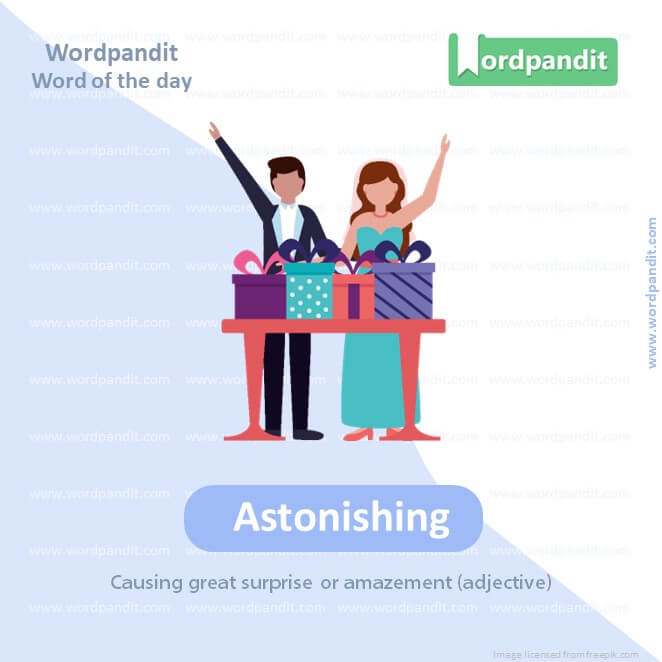
WORD-1: Astonishing
CONTEXT: a few days of astonishing corporate drama in which the board ousted Chief Executive Sam Altman.
SOURCE: Washington Post
EXPLANATORY PARAGRAPH: Imagine seeing something so amazing and surprising that it makes you say “wow!” really loud. That’s what ‘astonishing’ means. It’s like seeing a magician pull a rabbit out of a hat and being super surprised and impressed.
MEANING: Causing great surprise or amazement (adjective).
PRONUNCIATION: uh-STON-ish-ing
SYNONYMS: Amazing, Astounding, Marvelous, Staggering, Stupendous, Surprising, Wonderful.
USAGE EXAMPLES:
1. The magician’s astonishing trick left the audience speechless.
2. It was astonishing how quickly the little plant grew.
3. The view from the mountain top was truly astonishing.
4. She made an astonishing recovery after the illness.
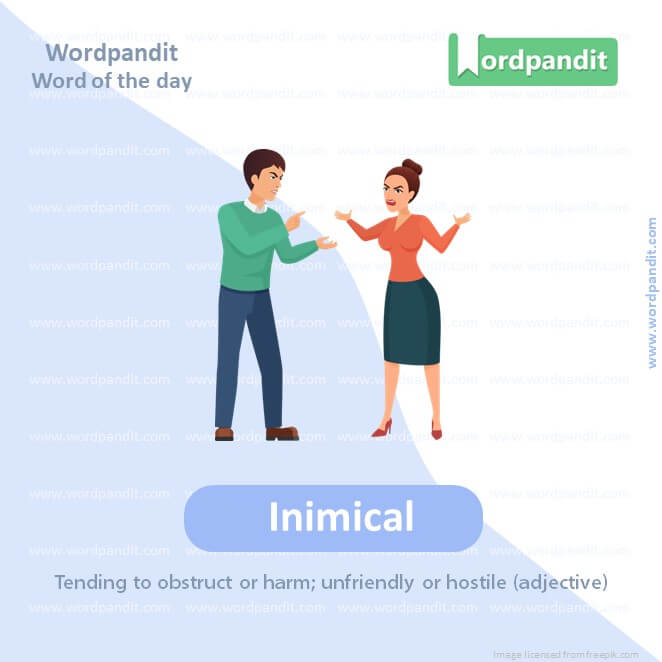
WORD-2: Inimical
CONTEXT: the “alignment problem” of ensuring that intelligent machines don’t become inimical to human interests.
SOURCE: Washington Post
EXPLANATORY PARAGRAPH: If someone or something is inimical, it means they are not friendly and could cause harm or trouble. It’s like when a character in a story is against the hero and makes things difficult for them.
MEANING: Tending to obstruct or harm; unfriendly or hostile (adjective).
PRONUNCIATION: in-IM-i-kul
SYNONYMS: Hostile, Harmful, Unfavorable, Adverse, Antagonistic, Detrimental, Unfriendly.
USAGE EXAMPLES:
1. Smoking is inimical to good health.
2. His inimical attitude made cooperation difficult.
3. The harsh climate was inimical to the crops.
4. They faced inimical forces during their journey.
WORD-3: Culmination
CONTEXT: the Atlantic was the culmination of a power struggle between the company’s two ideological extremes
SOURCE: Washington Post
EXPLANATORY PARAGRAPH: Culmination is like the big ending of something after a lot of things have happened. It’s like when you build a big tower of blocks and finally put the last block on top – that’s the culmination.
MEANING: The highest or climactic point of something, especially as attained after a long time (noun).
PRONUNCIATION: kul-mi-NAY-shun
SYNONYMS: Climax, Peak, Pinnacle, Apex, Zenith, Summit, Crest.
USAGE EXAMPLES:
1. The championship game was the culmination of a great season.
2. The project reached its culmination after years of hard work.
3. The concert was the culmination of the festival.
4. His career reached its culmination with the award.
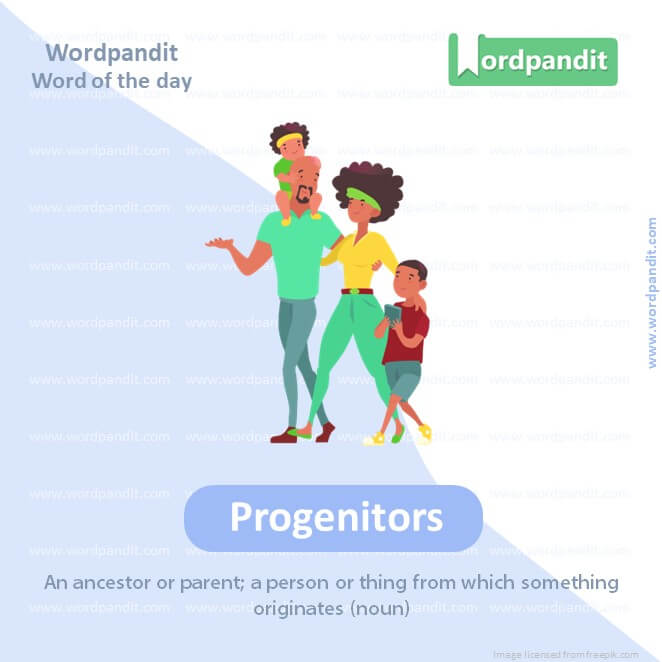
WORD-4: Progenitors
CONTEXT: the machines wiping out their human progenitors or with humans using the machines to do so themselves.
SOURCE: Guardian
EXPLANATORY PARAGRAPH: Progenitors are like the very first family members from a long, long time ago. They are like your great-great-great-grandparents who started your family.
MEANING: An ancestor or parent; a person or thing from which something originates (noun).
PRONUNCIATION: pro-JEN-i-tors
SYNONYMS: Ancestors, Forebears, Forefathers, Precursors, Founders, Originators, Pioneers.
USAGE EXAMPLES:
1. The progenitors of jazz include musicians from the early 20th century.
2. Our cultural traditions were shaped by our progenitors.
3. Many scientists regard Isaac Newton as a progenitor of modern physics.
4. The family tree showed the names of our progenitors.
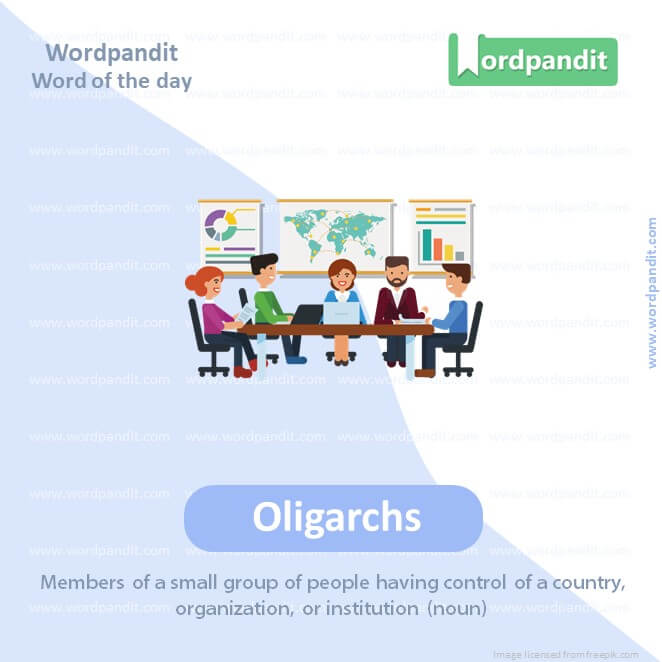
WORD-5: Oligarchs
CONTEXT: the impact of the venture capitalist in California or the petroleum oligarchs of Russia and the Middle East.
SOURCE: Guardian
EXPLANATORY PARAGRAPH: Oligarchs are like the bosses or big leaders in a place, usually very rich and powerful. They are like the kings or queens of businesses or countries.
MEANING: Members of a small group of people having control of a country, organization, or institution (noun).
PRONUNCIATION: OL-i-garks
SYNONYMS: Magnates, Tycoons, Barons, Moguls, Powerbrokers, Elites, Nobles.
USAGE EXAMPLES:
1. The country was ruled by a group of wealthy oligarchs.
2. Oligarchs have significant influence in the corporate world.
3. The economic policies favored the oligarchs.
4. The power of the oligarchs was visible in the government decisions.
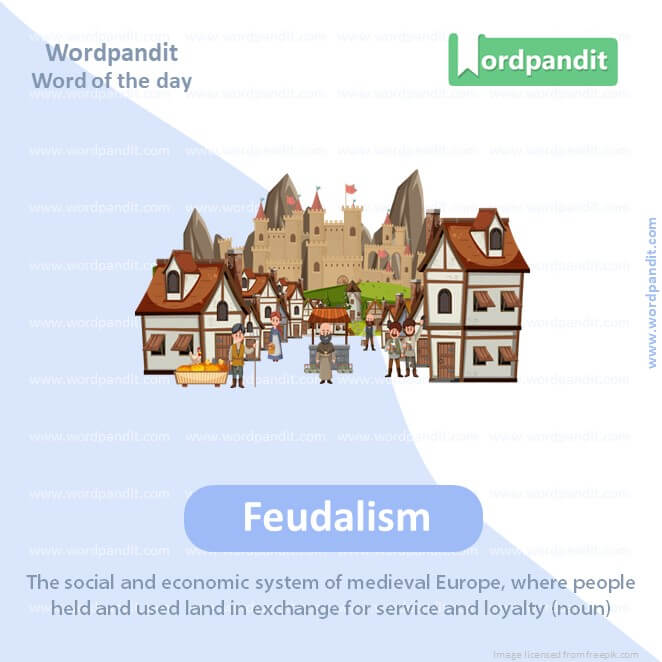
WORD-6: Feudalism
CONTEXT: the supergiant tech corporations that have spawned so many modern billionaires operate in ways that resemble feudalism more than capitalism,
SOURCE: Guardian
EXPLANATORY PARAGRAPH: Feudalism is a way of organizing people and land from a long time ago. It’s like a big game where lords own land and let knights protect it, and in return, the knights get to live on the land and have food.
MEANING: The social and economic system of medieval Europe, where people held and used land in exchange for service and loyalty (noun).
PRONUNCIATION: FYOO-duh-liz-um
SYNONYMS: Serfdom, Vassalage, Manorialism, Lordship, Dependency, Bondage, Subjugation.
USAGE EXAMPLES:
1. In feudalism, lords provided protection to their vassals.
2. The castle was a symbol of feudalism.
3. Feudalism was characterized by the relationship between lords and serfs.
4. The history book described the rise and fall of feudalism.
WORD-7: Arbiter
CONTEXT: There is little precedent for a civilian’s becoming the arbiter of a war between nations in such a granular way.
SOURCE: Guardian
EXPLANATORY PARAGRAPH: An arbiter is like a referee in a game. They are the ones who make important decisions, especially when people can’t agree on something.
MEANING: A person who settles a dispute or has ultimate authority in a matter (noun).
PRONUNCIATION: AR-bi-ter
SYNONYMS: Judge, Referee, Umpire, Mediator, Adjudicator, Decider, Moderator.
USAGE EXAMPLES:
1. The court appointed an arbiter to resolve the dispute.
2. In the game, the arbiter made the final decision.
3. The arbiter’s role was crucial in the negotiation.
4. As an arbiter, she had to be fair and impartial.
WORD-8: Euphemism
CONTEXT: a euphemism for schemes that typically involve injecting huge amounts of sulphur dioxide into the stratosphere to form a reflective blanket that might help cool Earth back down.
SOURCE: Guardian
EXPLANATORY PARAGRAPH: A euphemism is a nice or gentle way of saying something that might be a bit harsh or not so nice. It’s like saying ‘passed away’ instead of ‘died’.
MEANING: A mild or indirect word or expression substituted for one considered to be too harsh or blunt when referring to something unpleasant or embarrassing (noun).
PRONUNCIATION: YOO-fuh-miz-um
SYNONYMS: Softening, Understatement, Polite term, Mild expression, Indirect term, Substitute phrase, Gentle term.
USAGE EXAMPLES:
1. “Letting someone go” is a euphemism for firing them.
2. They used a euphemism to discuss the sensitive topic.
3. “Between jobs” is a euphemism for being unemployed.
4. The doctor used a euphemism to explain the patient’s condition.
WORD-9: Robustly
CONTEXT: They would all be at adequacy, and the scientific evidence very robustly supported that people living at adequacy.
SOURCE: Guardian
EXPLANATORY PARAGRAPH: Doing something robustly is like doing it really strongly and with a lot of energy. It’s like building a fort with lots of bricks so it’s super strong and won’t fall down.
MEANING: In a strong, powerful, or vigorous manner (adverb).
PRONUNCIATION: roh-BUST-lee
SYNONYMS: Strongly, Vigorously, Powerfully, Sturdily, Forcefully, Solidly, Staunchly.
USAGE EXAMPLES:
1. The team robustly defended their project idea.
2. He robustly argued his point in the debate.
3. The structure was built robustly to withstand storms.
4. She answered the questions robustly, showing her confidence.
WORD-10: Antisemitism
CONTEXT: That much I know, having directed Jeremy Corbyn’s leadership campaigns and called out the antisemitism of that period.
SOURCE: Guardian
EXPLANATORY PARAGRAPH: Antisemitism is when people are unfair or mean to Jewish people just because they are Jewish. It’s like not being nice to someone because of the color of their hair, which isn’t fair at all.
MEANING: Hostility, prejudice, or discrimination against Jews (noun).
PRONUNCIATION: an-tee-SEM-i-tiz-um
SYNONYMS: Bigotry, Prejudice, Racism, Discrimination, Intolerance, Xenophobia, Hatred.
USAGE EXAMPLES:
1. The museum had an exhibit on the history of antisemitism.
2. Antisemitism is a serious issue that needs to be addressed.
3. Campaigns against antisemitism aim to promote tolerance and understanding.
4. His speech was criticized for containing antisemitism.
vocabulary journal
Are you seeking ways to elevate your language skills? Consider diving into a vocabulary journal. This method has proven instrumental in learning and grasping new words. The benefits of maintaining a vocabulary journal are far-reaching, aiding students, writers, and language enthusiasts alike.
A vocabulary journal is a personal tool that pushes you to explore the depths of language beyond surface understanding. It doesn’t demand any complex skills; all you need is consistency, interest, and a willingness to learn. This simple, yet efficient, method aids you in enriching your language abilities by creating a personalized resource of words that you encounter and learn every day.
How exactly do you learn from a vocabulary journal? It starts from the moment you encounter a new word. Don’t just gloss over it. Instead, jot it down in your journal. With this, your vocabulary journal becomes a growing garden of words, where every new addition sprouts the opportunity for more profound knowledge. Following this method encourages self-education, as it fosters independent research into the meaning, synonyms, antonyms, and uses of the new word.
Moreover, a vocabulary journal is not meant for one-time usage. Regularly revisit your notes and try to use the words in your daily conversations or writings. Over time, these fresh words will naturally weave themselves into your lexicon, refining your language skills.
Being able to articulate your thoughts precisely is an empowering skill. A vocabulary journal is a pathway towards achieving this feat. No matter your current language capabilities, initiating and maintaining a vocabulary journal continues to be a worthwhile endeavor.
Enhancing your language skills with a vocabulary journal is synonymous with building a bridge between learning and understanding. Journey through the vast landscapes of language with a vocabulary journal in tow and discover the joy of never running out of words.







